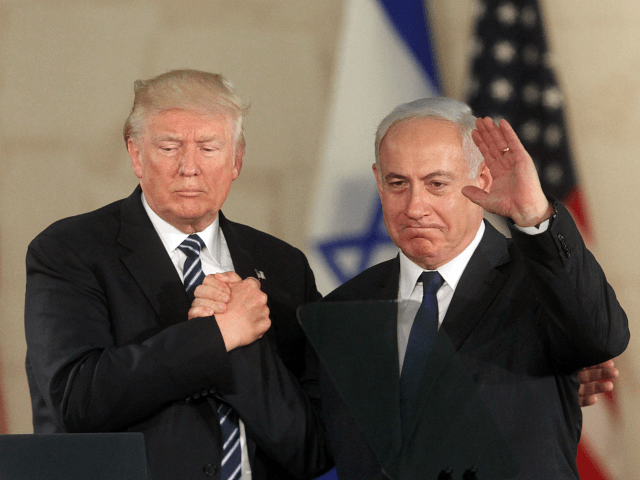Israeli Prime Minister Benjamin Netanyahu on Saturday praised President Donald Trump for securing three peace deals in six weeks between Arab countries and Israel, and expressed his hope that under the next U.S. administration more agreements would follow.
“The clear fact of the matter is that for 25 years we didn’t have a [normalization] agreement and under Trump’s leadership we have three deals in six weeks,” Netanyahu said.
He made his Hebrew-language remarks at a press briefing from Tel Aviv a day after the U.S. president announced that Sudan would normalize ties with Israel while on the phone with the two leaders.
During the Oval Office phone call, which was attended by reporters and Trump’s Middle East peace team including senior advisor Jared Kushner and envoy to the Israeli-Palestinian conflict Avi Berkowitz, Trump asked Netanyahu, “Do you think Sleepy Joe would have made this deal? Somehow, I don’t think so.”
Netanyahu, avoiding a partisan response, answered diplomatically, “Well, Mr. President, one thing I can tell you. We appreciate the help for peace from anyone in America, and we appreciate what you’ve done enormously.”
“Do you think Sleepy Joe could have made this deal, Bibi? Sleepy Joe?” Trump asked Netanyahu
Look at the answer 👇
https://t.co/WWhTLB0h7P pic.twitter.com/2EdKwWdUUm
— Stop Bullying Israel (@StopBullyingIsr) October 24, 2020
An Israeli reporter asked Netanyahu the next day if Trump had “embarrassed” him by dragging him into the U.S. election debate.
“You know, it’s very difficult to embarrass me,” Netanyahu responded.
The Channel 13 reporter also asked if Democratic candidate Joe Biden would prevent or at least delay any future normalization agreements during the transition period and if Netanyahu was concerned that a Democratic win would mean Israel will receive the “cold shoulder” after “putting all its eggs” in the Republican basket.
“The bipartisan support of both the Republicans and the Democrats is very important to Israel,” Netanyahu said. “I have always cooperated with U.S. presidents. Sometimes I agree with their policies and sometimes not – and that’s the case with Republicans and Democrats alike.”
But he went on to say that it was under Trump’s leadership that the normalization deals with the United Arab Emirates, Bahrain and most recently, Sudan, were established.
“That’s a fact,” he said. “And we are very appreciative of that.”
“I think the that that appreciation cross many of the parties in Israel and many people appreciate it – as well as I,” he added.
President Donald Trump on Tuesday celebrated the signing of the “Abraham Accords,” a peace deal between Israel and Bahrain and the United Arab Emirates brokered by the United States. https://t.co/kim5DSQiPs
— Breitbart News (@BreitbartNews) September 15, 2020
“I appreciate the decision and the steps by President Trump, in Jerusalem, in the Golan and of course with the peace deals,” he said, referring to the American president’s December 2017 decision to relocate the U.S. embassy to Jerusalem and his March 2019 recognition of Israeli sovereignty over the Golan Heights.
He went on to say that while he wasn’t interested in “predicting the outcome of the elections one way or another, I hope this policy [of normalization] will continue because it’s the right one.”
Netanyahu said that while he had always believed in a policy of peace with the Arab world, he couldn’t always convince others of the same.
“We had to take a lot of clandestine steps [towards normalization] many of which weren’t revealed, sometimes not even to the U.S., but they proved themselves,” he said.
“I’m happy that the U.S. joined this effort and today is leading it, it’s a very important thing because it leads to peace.”
Addressing the Israel-Palestinian conflict, Netanyahu said the core issue was that the Palestinians refuse to “abandon their delusional demands that will bring an end to Israel and that no rational [Israeli] government would agree to.”
One of the main sticking points of the conflict is the Palestinian “the right of return” in which Palestinian refugees and their descendants — who number in the millions — would be allowed to return to their original homes in Israel – a demand that would effectively spell the end of the Jewish state by demographic means.
President Donald Trump on Tuesday at an ABC News town hall promised peace in the Middle East without losing American soldiers in unwinnable wars. https://t.co/EiJIkYaqKw
— Breitbart News (@BreitbartNews) September 16, 2020
According to the Israeli premier, the Palestinians will only give up those demands “once they see that the whole Arab world is making peace with Israel.”
“That is to say, it is not a breakthrough with the Palestinians that will bring peace with the Arab world. The opposite is true: peace with the Arab world will bring peace with the Palestinians.”
He concluded by reiterating his hope that the next administration would continue on the same path.

COMMENTS
Please let us know if you're having issues with commenting.